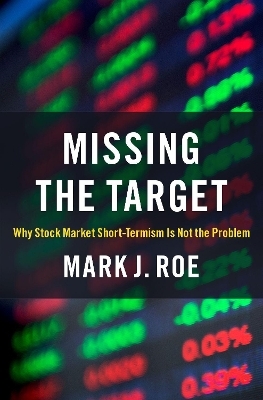
Missing the Target
Oxford University Press Inc (Verlag)
978-0-19-762562-0 (ISBN)
Why stock-market short-termism is not causing severe damage to the American economy
According to many political leaders, pundits, and corporate lawmakers, stock-market-driven short-termism - when corporations prioritize immediate results in the next quarter over their longer-term interests - is harming the American economy. This view, popular in influential circles, sees short-termism as causing sharply declining research and development (R&D), too many stock buybacks, and severe environmental harm. But the data fits badly with this black-and-white representation of short-termism.
Mark J. Roe analyzes the best data on R&D, corporate borrowings and buybacks, and long-term investment trends to show that stock market short-termism is not at the root of these economic problems. The book shows that blaming short-termism overlooks the real causes of declining investment, R&D changes, and environmental deterioration. By pointing to other sources of tension like accelerating technological change, rising political uncertainty, and repeated economic disruptions, Missing the Target argues for a more nuanced understanding of the challenges to the American economy. Roe disproves many of the core claims against short termism. R&D spending, for example, is rising faster than the economy is growing. Its government R&D support that's been falling. Reversing that decline is the best first target for bettering American R&D.
Missing the Target deepens the discussion of the American economy by analyzing the factors that contribute to current trends and by making a bold but straightforward claim: stock market short-termism is not the problem.
Mark J. Roe is the David Berg Professor of Corporate Law at Harvard Law School. His research focuses on corporate structures and how they relate to politics, interest groups, and popular opinions of the corporation.
Introduction
PART I: Looking for Stock-Market-Driven Short-Termism's Impact on the Economy
1. The Short-Term Problem Perceived
2. Looking for the Economy-Wide Impact
3. The Social Costs of Stock-Market Short-Termism Understood, Clarified, and Defined
4. The Heavy Cost of Misdiagnosis: Missing the Targets
PART II: Analyzing the Stock Market's Impact
5. Concept and Evidence for Stock-Market-Driven Short-Termism
6. Concept and Evidence Against It
7. Evaluating the Firm-by-Firm Short-Termism Evidence
PART III: The Proposed Solutions' Limited Efficacy-And Their Costs
8. Cures and Their Sharp Limits: Insulating Executives from Financial Markets
9. Cures and Their Sharp Limits: Taxing and Regulating Financial Markets
PART IV: The Politics of the Corporate Short-Termism Controversy
10. Confusing Short-Termism with Accelerating Technological Change
11. Short-Termism as Popular Narrative: Connotation, Category Confusion, and Confirmation
12. Political Support at the Top of the Corporation: Executives vs. Shareholders
13. Political Support Outside the Corporation: Popular Opinion vs. Wall Street
Conclusion
Index
| Erscheinungsdatum | 31.01.2022 |
|---|---|
| Zusatzinfo | 20 illustrations |
| Verlagsort | New York |
| Sprache | englisch |
| Maße | 242 x 164 mm |
| Gewicht | 449 g |
| Themenwelt | Recht / Steuern ► EU / Internationales Recht |
| Recht / Steuern ► Wirtschaftsrecht | |
| Wirtschaft ► Betriebswirtschaft / Management ► Rechnungswesen / Bilanzen | |
| Wirtschaft ► Betriebswirtschaft / Management ► Unternehmensführung / Management | |
| ISBN-10 | 0-19-762562-2 / 0197625622 |
| ISBN-13 | 978-0-19-762562-0 / 9780197625620 |
| Zustand | Neuware |
| Informationen gemäß Produktsicherheitsverordnung (GPSR) | |
| Haben Sie eine Frage zum Produkt? |
aus dem Bereich


